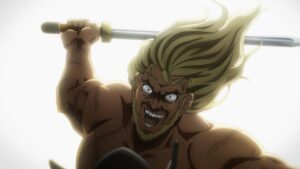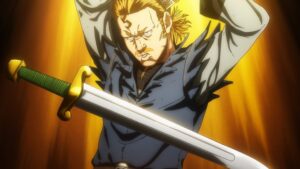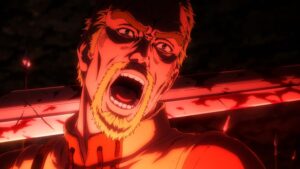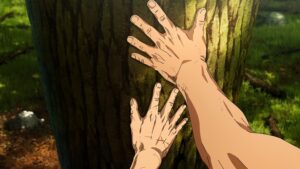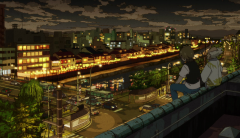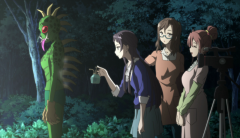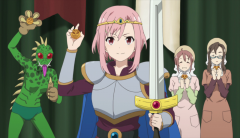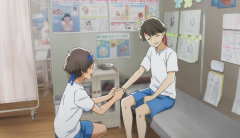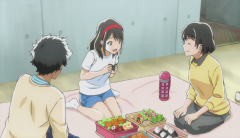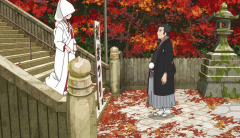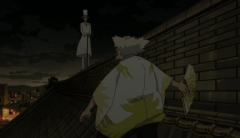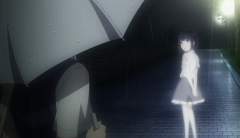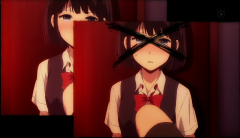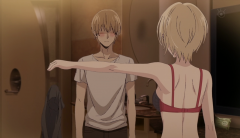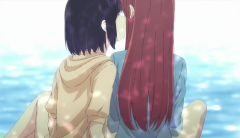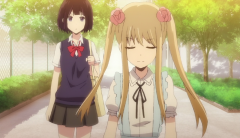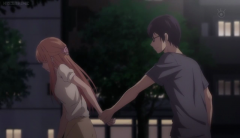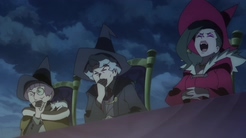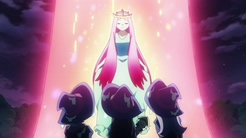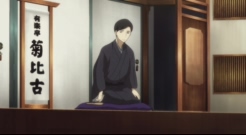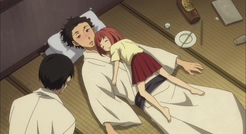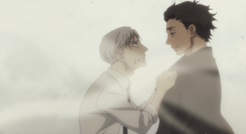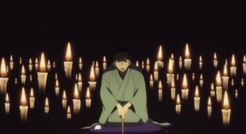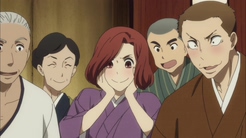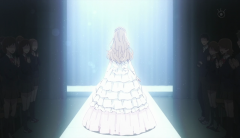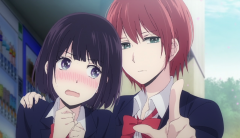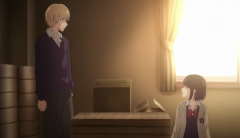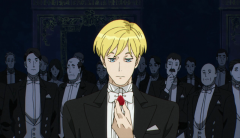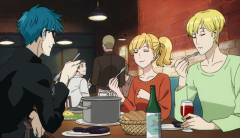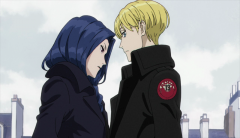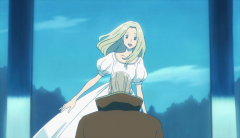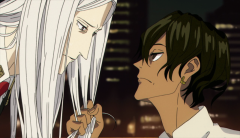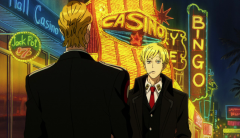Imagine my utmost amazement when a show that I wasn’t that confident on taking in the beginning turned out to be one of the most solid offering this season had to offer. ACCA is the most recent anime adaptation from mangaka Natsume Omo, which despite isn’t a household name, many of her works (6 titles of them) have been translated to English, a privilege that rarely seen among this industry. Watching ACCA though, it’s easy to see her appeals: attractive and recognizable character designs, detailed world settings, complex yet laid-back themes and featuring characters that always in the move. ACCA embodies all those traits with slow but confident pacing that have an ending that perfectly tied up all the plot threads- for me one of the best ending I have seen in years. ACCA isn’t perfect by any mean, after all, adapting full 6 volumes into one cour of 12 episodes mean that they have to cut LOTS of extra details. Although I would’ve preferred more if the show has more time to focus on these 13 Districts and their ACCA’s representatives, the mere fact that they manage to make the plot points flows seamlessly, while still engage (or rather, enhance) viewers’ interest by each passing episode isn’t an easy feat at all; so a special shout out for Madhouse for this wonderful adaptation.
At first, what really makes ACCA compelling to watch is its rich world setting; as the show’s diverse settings is one of its identity itself. The 13 districts all have their own distinctive traits and are vastly different in wealth and their sub-cultures; which remind me a bit of the worlds in Kino’s Journeys. In fact, it’s too different from each other that the only thing that they all SHARE is its autonomy. I should remind you, the demand for putting background details for this show is insane, as they have to show the characteristics of all 13 districts in the little time they had without obstruct the pacing, but Studio Pablo (you might need to remember that name- They are an anime background company, the team who also handled the gorgeous visual backgrounds in Flip Flappers) did a marvelous job in putting as much details as possible from those districts. The two poorest districts were given more development than the rest with their own stories and struggles and as a whole, Dowa Kingdom is a place that I’m more than happy to spend more time to. The ACCA’s representative member in each district, likewise, all given just about enough personality to both inform us their own characters, and how the uniqueness in the district they work in starts to influent them. Regrettably, I still feel the show doesn’t have much screen time to flesh out those ACCA members but that is the sacrifice I’m willing to take…
… Because ACCA is masterclass at its storytelling and pacing. Even now when I’m looking back at the series, I don’t see any wasted segments, any meaningless conversations or any useless developments. Everything the show puts in, they are there for a reason, either to advance the plot, or to flesh out the characters, or give the show more identity. All the plot developments were hinted subtly way ahead, so when the BIG ANOUNCEMENTS take place, we don’t feel like them pulling the rug under our feet, but instead we’re well prepared to take such twists in. Secondly, all the character’s usual habits like Jean’s constantly smoking, Nino taking pictures, or Lotta eating cakes all the times not only tell us their personality, but also those details suggest a deeper plot meaning (see the relevance of cigarettes here? Or the reason why Nino taking pictures all the time?). Moreover, for a show that mainly about the scheming, plan within a plan within a plan about the coup, there are surprising overloaded with breads, cakes and deserts. Characters in this show fall in love with breads, buying cakes when scheming about a plan, making friends through the love of toasts (which ultimately saved Lotta’s life), and to be fair, the love of bread is what give birth to Jean and Lotta to begin with (guess where their Mom met their father? A bakery of course), but strangely, those moments of cake-porn never feel out of place in this ACCA world. For me personally, cakes and toasts will be what I miss the most about this show. And then the pacing. While many would argue the ACCA is snail-moving slow, and they’re mostly right, this is one of the most confident pacing that I’ve seen this season. It’s slow, but it never drags. It’s slow, but it keeps getting more intense as it goes on; steadily to its final showdown.
Another attribute; however, that really sets ACCA well apart from other political thrillers, or any thrillers in that extend; lies in its almost non-existence of violence and dark intentions. ACCA is an idealistic show; characters in ACCA think and behave for the benefit of the kingdom, where sacrifice of individuals can be necessary to keep peace for the nation (That make the backstory of princess Schnee even more tragic). Even the show’s main villain’s thrust to destroy the throne wouldn’t necessary qualified as evil either; after all, all he wanted is the “rightful” power and control for his own district, one of the richest and most influential district. If shows like Berserk or Death Parade keeps addressing the dark and ugliness of human’s nature, show like ACCA is the opposite. It’s almost too bright, too optimistic about human, which is be no mean these characters aren’t complex. The characters are plotting plans within plans, and sometimes their actions are already manipulated by other’s, but more or less their objectives always aim for the better of the people, with little to no gain for themselves. While personally I don’t have much of an issue with it, I do feel portraying the world that devoid of violence or ill-will might split the audience on being unrealistic, and that ending where too much of good things happened (look, Pranetta hits gold) could turn some viewers off for being over-cheerfulness.
Madhouse’s execution to this series is overall top-notch. The use of strong color pallete, for example, gives the show so much texture and more impressively, they fit in with the tones so well that those color palletes don’t stick out like sore thumb. Episode 8, for example, detailing the one big flashback of princess Schnee through Nino and his father’s eyes is textbook example on how to use those colors the most effective. The music, likewise, is really on point most of the time and the shot compositions have great flairs, cinematic, and sometimes they convey the mood and tension just by showing one character’s position to another (like when Mauve informed Jean about his royal heritage) or putting the characters in the soft, blurred background (most prominently through the climax of the last episode). In one word, exceptional. But there is one minor issue, though. For a show that have high caliber of crafting like ACCA, the animation, the actual motions, is lacking. Characters stay at static positions most of the time, and even their expressions don’t change much. Which for me is fair, because ACCA has always been about the calm, about what beneath the surface so it’s only appropriate that we don’t get to see much actions on the surface, both in term of actual movement, or the plot itself.
ACCA also is extremely well-grounded in terms of underlining characters’ chemistry. Although I would argue that those characters don’t change/grow much in terms of character’s development (see, in the end, Jean is still the same guy we saw at the beginning, so is Lotta, or… gasp, Owl), but the show delivers such natural chemistry between the cast, especially the trio Jean – Nino – Lotta that it’s such a nice time to see them hanging around together. Each of the pair give off a different chemistry to boost, and they always feel so effortlessly to each other that when Jean and Lotta find out the truth about Nino, it’s bitter and sweet at the same time. For a show that is more about the detachment (everything flows underneath the surface), they understand that the underlying emotions of the show is the buddy relationship between Nino and Jean (and well, Schnee’s tragic past) so rightfully ACCA gives their final moments on those two as a sweet farewell to us.
But like I mentioned earlier, ACCA is not without its issues. One of it is that the show has to compress its source material to only 12 episodes, as a result in the last third of the show the sweet cakes and deserts just evaporated (but I can understand, we wouldn’t take the coup seriously with all those cakes and breads so they have to go), and like I said, more time to flesh out the uniqueness of each districts and their ACCA representatives would benefit the show greater. Secondly, by giving much attentions to the royal and the members in power, we don’t get to see the Dowa Kingdom in ordinary citizen’s point of view. I mean, we hardly know anything about Jean and Lotta’s father, a commoner, for example. Moreover, being slow and static and diplomatic-centric also means that when the show has to raise up its tempo; most notably during the Lotta assassination; they are clumsy in both storytelling and execution to the point of near-ridiculousness. And lastly, show with this deliberate pacing won’t attract much of the mainstream audience, in which if that is the case, the only think I can say is that they have missed out one of the best well written gem this year had to provide and trust me, this show will hold up well with time. I will definitely check out more of Natsume Omo’s works.

